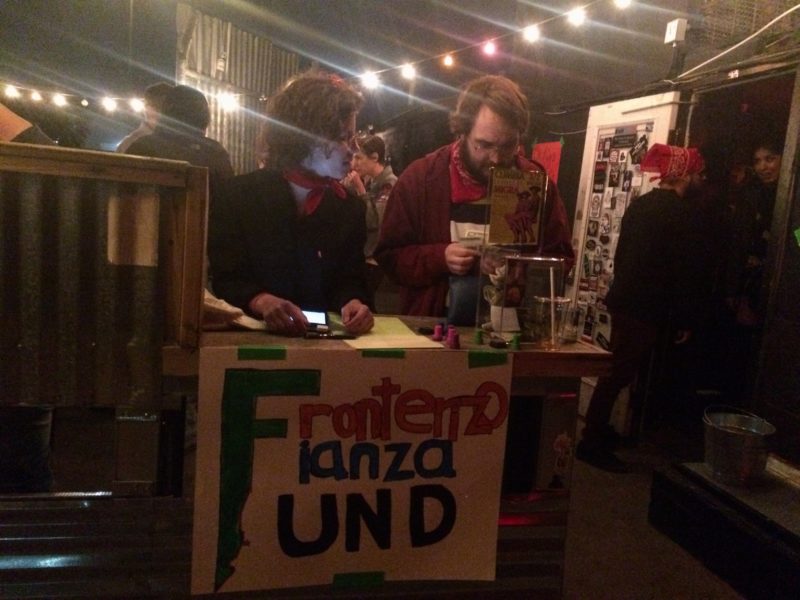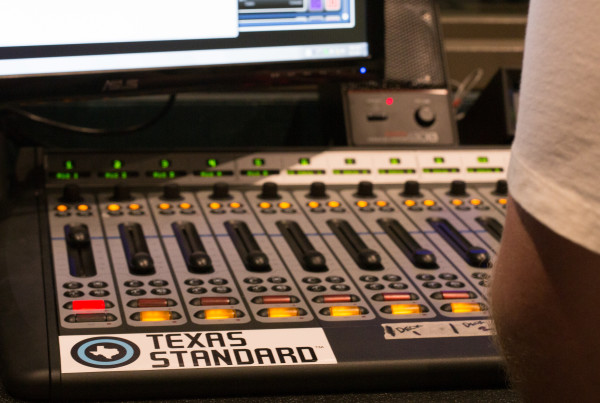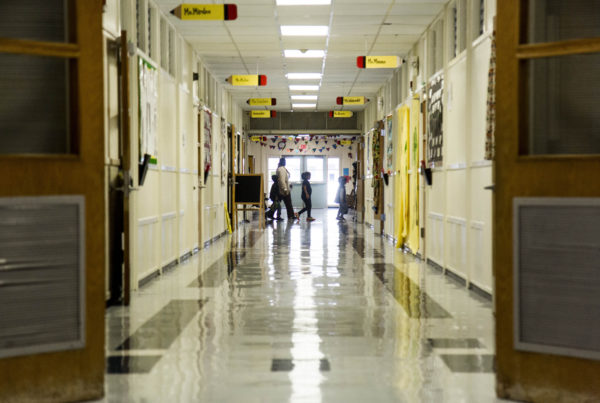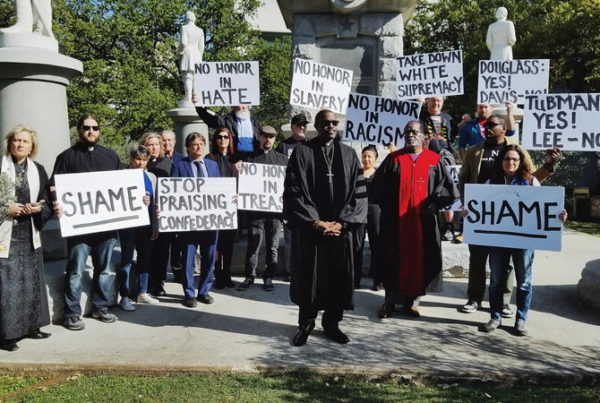Since President Donald Trump took office, more undocumented immigrants are being held in detention centers, waiting for their day in court. Some are eligible for release on bond. But bond amounts can vary widely, from $1,500 to upwards of $20,000. And some detainees just can’t afford these bonds. Now, a group in El Paso is starting to raise money to pay for the bonds. They’re calling it the Fronterizo Fianza Fund.
It’s Saturday night and there’s a huge crowd at Neon Rose, a popular bar in El Paso. People clutch beers on the back patio or dance furiously inside. A few wait in line for food. People are here to eat, drink and dance, but also to raise money. Gabriel Solis stands outside the bar, taking donations and stamping hands.
“We are raising money for the Fronterizo Fianza Fund. The funds will go to get people who are in ICE processing centers out of those centers, pay for legal fees and commissary funds,” he says.
Solis is with the Detained Migrant Solidarity Committee, a local group that’s hosting the cumbia fundraiser.
“We’re trying to dance some cumbias for, like, a rad cause,” Solis says.
By the end of the night, after at least one cumbia remix of Rhianna, his group has raised $2,700. Most of that will go toward posting bond for a woman named Blanca Vasquez, who says she fled El Salvador with her 12-year-old son after her husband was murdered and the rest of her family was threatened. She turned herself in to Border Patrol and said she was seeking asylum. Vasquez was separated from her son – a practice immigrant advocates say has increased since Trump took office. Vasquez’s son, not yet a teenager, was sent across the U.S. to a secure facility in New York. She was being detained at the El Paso Processing Center – until this day.
“So we’re on our way to the detention center to pick up Blanca,” says Taylor Levy, as she drives fast down I-10 towards the detention center near the El Paso airport. She’s unable to contain her excitement. Levy works with Annunciation House, a shelter for immigrants and refugees. It provides them with food, clothes, and a place to stay while they figure out what’s next.
Part of Levy’s job is getting people from the detention center to the shelter. Sometimes, that can get tricky.
“I picked up one lady once and she didn’t speak almost any Spanish. She spoke an indigenous dialect,” Levy says. And she didn’t understand who Levy was or what was happening.
“And so I kept drawing pictures of crosses and churches and like trying to explain that I was a good person and I was here for her,” Levy says. “But she was really scared of me ‘cause random white girl in a nice car, it’s like who are you?”
Levy says it seemed like Blanca Vasquez was on the fast-track to be deported. But then some lawyers in Pennsylvania read about her case and decided to take it on. She won her bond hearing. The judge set her bond at $7,500 and a bunch of people got to work raising money. Throw in cumbia night, and now Vasquez is getting released.
The detention center is off a busy, six-lane street. Levy doesn’t see Vasquez waiting, and a guard says she hasn’t been released.
“So this is where the fun waiting happens,” Levy says. “And we just park in this no parking anytime area and sit here [laughs] and wait to see if she comes out. We could be waiting ten minutes or we could be waiting hours.”
And so, we wait…
El Paso is one of the harshest districts in the immigration system. The immigration judges here deny more than 90 percent of asylum cases. It’s hard to win bond in the first place, and it’s also difficult to win an affordable bond.
Alan Dicker is with the Detained Migrant Solidarity Committee, the group behind the Fianza bail fund -– one of several immigration bail funds that have launched in the last few years. Dicker says it’s heartbreaking to tell detainees with $20,000 bonds that he can’t help them out.
“And they either have to sit in detention while their court process plays out, which can be well over a year, or they sign their own deportation out of desperation because they don’t want to be in that situation even though they might have a good case,” Dicker says.
On top of that, it’s really hard to get legal services when you’re in detention. Ian Philabaum is with Innovation Law Lab, a non-profit that helps immigration lawyers. He says if you can’t win or pay a bond offer, you’re even less likely to find an attorney.
“And if you go in front of an immigration judge without an attorney to argue your case, there’s an extremely higher likelihood that you will lose your case and be ordered deported,” Philabaum says.
So bonding out is an important first step.
We’ve been sitting outside the El Paso detention center waiting for Blanca Vasquez to be released on bond for over an hour, when Taylor Levy gets a call. ICE brought Vasquez directly to Annunciation House.
“Probably trying to be nice,” Levy says. “But they didn’t give us any heads up. But she is free, Blanca is out.”
A rush hour traffic ride later, we arrive at the shelter. Vasquez comes out with a huge, beaming smile. She’s dressed in jeans and a black button-up shirt with pink trim – the first real clothing she’s worn in months.
“Free,” Levy says. She and Vasquez embrace, simultaneously laughing and crying. Vasquez says she’s grateful to everyone who donated to her bail fund. She can’t pay them back but hopes God blesses them.
Her ordeal isn’t over, though. Vasquez lifts up a pant leg to show off her ankle monitor. She still has to show up in court for her asylum case. But she can prepare for that day in freedom, reunited with her young son, who is also now out of a New York secure facility. For now, they’re living as a family again.















